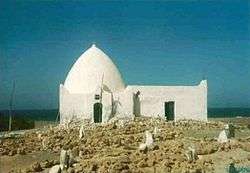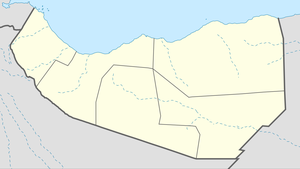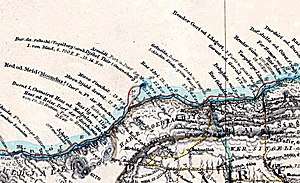Maydh
Maydh (also transliterated as Mait or Meit) is an ancient port city in the northern Sanaag region of Somaliland.
Maydh | |
|---|---|
Town | |
 | |
 Maydh Location in Somaliland . | |
| Coordinates: 11°00′18″N 47°06′36″E | |
| Country | |
| Region | Sanaag |
| Time zone | UTC+3 (EAT) |
History

According to Augustus Henry Keane, Maydh represents an early center of dispersal of the Somali people. National genealogies collected by the scholars Cox and Abud assert that many clan patriarchs are buried in or nearby the town.[1]
The city of Maydh was home to Sheikh Isaaq Bin Ahmed Al Hashimi (Sheekh Isaxaaq), who, according to tradition, moved to Somaliland from the Arabian Peninsula in the 12th or 13th century CE. He is considered to be the founding father of the large Isaaq Somali clan that predominantly inhabits Somaliland, as well as parts of Djibouti and Ethiopia. Sheikh Isaaq's domed tomb is also located here.[2]
Somaliland in general is home to numerous such archaeological sites, with similar edifices found at Haylaan, Qa’ableh, Qombo'ul and El Ayo. However, many of these old structures have yet to be properly explored, a process which would help shed further light on local history and facilitate their preservation for posterity.[3]
In his medieval Futuh Al-Habash ("Conquest of Abyssinia") documenting the Abyssinian–Adal war, the chronicler Shihab ad-Din notes that the Habar Magaadle Isaaq were at the time the predominant authority in Maydh.[4] He thus consistently refers to them as the "People of Mait".[5]
References
- A.H. Keane, Man, Past and Present, (Cambridge University Press: 1920), p.485.
- I.M. Lewis, "The Somali Conquest of the Horn of Africa", Journal of African History, 1 (1960), pp. 219-220
- Michael Hodd, East African Handbook, (Trade & Travel Publications: 1994), p.640.
- Peter J. M. McEwan, Nineteenth-Century Africa, Volume 2 of Readings in African History, (Oxford University Press: 1968), p.183.
- Charles Lee Geshekter, Somali Studies International Association (1992). The Proceedings of the First International Congress of Somali Studies. Scholars Press. p. 186. ISBN 0891306587.